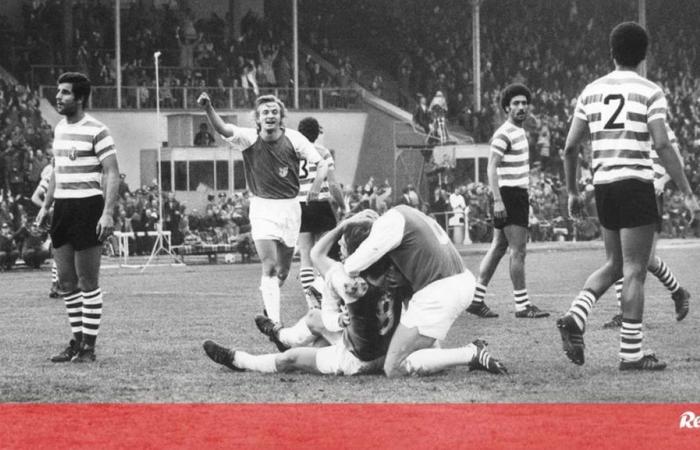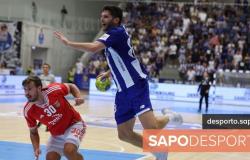It was in the German capital that Sporting learned of the coup d’état. Returning to Lisbon was an adventure
• Photo: Getty Images
The game had gone badly the day before: Sporting, who had wasted a rout in Alvalade (1-1), had conceded in Magdeburg (1-2) and were out of the Cup Winners’ Cup final with Milan. At the Berlin Wall, where they were preparing to cross the line that separated east from west, the green and white complied with the strict bureaucracy in force in order to travel to Frankfurt. “That’s when we heard for the first time that there had been a coup d’état in Portugal”, recalls Mário Lino, 87 years old, then Leonine coach and future national champion. On the trip to Frankfurt “president João Rocha was ahead of us, in a private vehicle, ordered the bus where we were going to stop and gave us the information”, he details. Carlos Pereira, left-back of the famous Leonine team, confesses: “We didn’t pay much attention to it. Whenever we went abroad there was news like that, mainly of a political nature, which didn’t correspond to the truth.”
At the airport, TAP ground staff informed us that the flight to Lisbon was cancelled, that the borders in our country were closed and the airspace was closed. And it was confirmed that a coup d’état was underway. The delegation then went to Madrid and it was there that the information reached a worrying dimension: “They painted us a terrible picture, with dead people, cannons in the streets, bloody fighting”, recalls Carlos Pereira, traveling to a time when telephone contacts were very common. difficult. Míster Lino finally felt “a heavy atmosphere among the players and beyond.”
Concern accompanied the Sporting fans on the bus journey between the Spanish capital and Badajoz, the border chosen for entry into Portugal. The coach states that it was decided “that our bus would leave Alvalade and be on the other side to take us to Lisbon”, a good intention that clashed with the seriousness of the events. “When we arrived in Badajoz we realized that the queue to enter Portugal was endless”, says the then left-back of the future national champion: “It was then that President João Rocha intervened with all the influence he had and unblocked the situation. We got off the bus, picked up our things and walked along the long line that led to national territory. In general, people were angry, because they had been there for many hours and didn’t think it was right that we, who had just arrived, were there. we were ahead of them, even though we were a football team and, in this case, Sporting.
Mário Lino recognizes that, upon arriving in Elvas, the group stabilized emotionally, despite some ridiculous adventures: “We slept there, in a hotel that didn’t have beds for everyone; many stayed on the bus, others in the corridors. But we guaranteed the essential: the resulting tranquility of contact with our families and the certainty that everyone was well and the revolution, after all, had been peaceful”.
German tricks to intimidate
The trip to Magdeburg started badly: the Germans did everything to affect Leonine’s tranquility. Wagner Canotilho, the team’s conductor, recalls that “it all started with the crossing of the wall”: “We spent an infinite amount of time entering the country. The bus was stopped waiting for authorization to enter and police officers at turns invaded the vehicle with questions and more questions, trying to intimidate us.” But the use of these tricks continued for the rest of his time in East Germany. “The hotel, for example, did not have the minimum conditions for a football team”, explains the player who Mário Lino says was the most important in the functioning of the team. Wagner remembers, finally, that the next match for the championship was with Belenenses, “who didn’t want to postpone the game. Even though we were tired, we won 4-1”.
A GREAT EPIC WITH OWN NAMES
JOÃO ROCHA. In difficulties, the president took command of operations. He took the initiative, unblocked problems and presented solutions, using the power he had as the club’s top manager. He was the one who defined the itinerary from Berlin to Lisbon and minimized the consequences. When the delegation arrived in Badajoz, the borders were closed. No one could pass. He spoke personally to General Spínola and resolved the issue.
THOMAS. He was a substitute in Magdeburg, came on in the 70th minute, replacing Paulo Rocha and wasted the 2-2 that gave Leonine qualification for the final with Milan, in one of the last moves of the game: “In the 87th minute, Marinho scored a great play on the left, he gave me the ball and I, alone, with the goal open, shot over the top. He says that, throughout his life, “I often wake up, affected by this damn thing.”
CARLOS PEREIRA. He was having a great season, fulfilling his destiny of being Hilário’s successor. In the Alvalade game, misfortune knocked on his door: “It was a move from them on the left, culminating in a tense pass into the middle of the area; I was well placed but I got in the way and ended up putting the ball in my own goal.” The move, in the 62nd minute, put a brake on Sporting’s momentum but, in the end, the green and white waste was immense.
DINIS. The left winger was being a devil on the loose. In the balance of a game full of scoring opportunities created, he was the protagonist of the biggest one of all, when he missed a penalty.
YAZALDE. The Argentine was the big absentee from the semi-final. In his dream season, at the end of which he scored 46 goals and won the European ‘Golden Boot’, he was injured. He didn’t play any of the games and, as expected, he was greatly missed by the team. In Alvalade, if he had been on the field, he would have been the one to score the penalty.
MANACA. Playing as a right-back, he scored the goal that led Sporting to a draw in Alvalade – in the 76th minute. A brilliant, head-first entry that smashed the German wall.
MARINE. He would be the player in best shape at Sporting. In the second leg, on April 24th, he scored the goal that still made the green and white team dream. He scored in the 78th minute, reducing the difference to 1-2, and in the 87th minute he made the great move that gave Tomé a draw (and qualification).
By Rui Dias
two
Leave your comment
Tags: Carnation Revolution Berlin Wall Field
--





